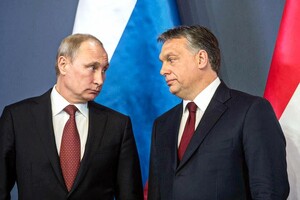Budapest insists that the European Union reconsider its approach and advance truce talks to avoid a recession.

Hungary calls for immediate peace talks to stop the war Russia has waged against Ukraine. Budapest warns that a protracted conflict is fueling an economic crisis that could shake governments across Europe.
The Financial Times writes, adding that the political adviser to the Prime Minister of Hungary, Balash Orban, called the truce “the only chance” to avoid a recession. He predicts that EU governments will move from military support to Ukraine to “rational.” And the war waged by Russia will end in a few months.
The publication reminds that Budapest has long been Moscow's closest partner in the EU and has caused concern in Brussels since the beginning of the Russian invasion of Ukraine due to its unwillingness to sever relations with the aggressor country. Balash Orban said that some EU countries were too eager to clash with Vladimir Putin and thus dragged the continent into crisis. According to him, Europe needs to abandon such a strategy or face the fact that economic pressure will destroy public support for military aid to Kyiv.
“They want to go to war. They see that they can defeat Putin, that they can occupy the Kremlin. And this is their goal. At the beginning of the conflict, at least in the media, this was a common opinion. But I am ready to bet on what everything will look like in four months. There will be more rationality, “said an adviser to the Hungarian prime minister.
Read also: NATO Secretary General believes that Russia's war against Ukraine will end at the negotiating table
” In reality, the price of utilities, energy, political destabilization, middle-class suffering will all become a daily problem. In Portugal or Spain, people will not accept the fact that they are at war because it is very far from them. So there will be political tension, “he said.
The comments of the Hungarian prime minister's adviser run counter to the rhetoric of almost all NATO and EU capitals that support Kyiv in its defense against the Russian army. Since the beginning of the invasion, the Allies have given Ukraine billions of dollars in weapons. But warnings of dire economic consequences and predictions of a recession by governments and central banks have sparked discussions among EU leaders about how they should respond. Some economists are pushing for radical measures, such as setting maximum energy prices.
Orbán claims that Budapest condemns the Russian invasion. But unlike other EU capitals demanding Putin's defeat, Hungary says “now is the time to sit down and calm down, our main goal in the coming months should be negotiations, peace and a ceasefire.”
“We do not want to provoke problems. But if you try to pursue a policy detached from reality, you can simply lose people's trust. And this is exactly what we are afraid of now. That if you look around, you are unlikely to find an honest discussion of the current situation, “said Balash Orban.
The Financial Times recalls that since Viktor Obran became Hungary's prime minister for the second time in 2010, his country became the main voice in the EU, which called for better relations with the Kremlin. Especially after Putin annexed Crimea in 2014, interfered in Western elections and brutally suppressed political opponents. Last month Budapest has successfully sunk EU sanctions against Russian oil and protected the Russian Orthodox Church from European restrictions. Hungary has also banned the supply of weapons to Ukraine through its territory.
Read also: Hungary has signed for the whole of Europe: there will be no restrictions on Russian gas in the seventh package of sanctions
Victor Orban and Volodymyr Zelenskyy also clashed in public in the first weeks of the war. Zelensky criticized the Hungarian prime minister during the EU summit for “hesitating” over sanctions against Russia. And Orban called the President of Ukraine his “political opponent.” However, Budapest supported Ukraine's aspirations to join the EU. Balash Orban said it was “difficult” to predict the nature of the EU's future relationship with Putin's government. And the union will have to discuss how to deal with Russia after the war.
“What we have been doing for the last 12 years can no longer continue because the situation has changed. So now we have minimized contacts. We are waiting for the war to end. And then we will sit down and find out what to do, “said the Hungarian politician.




